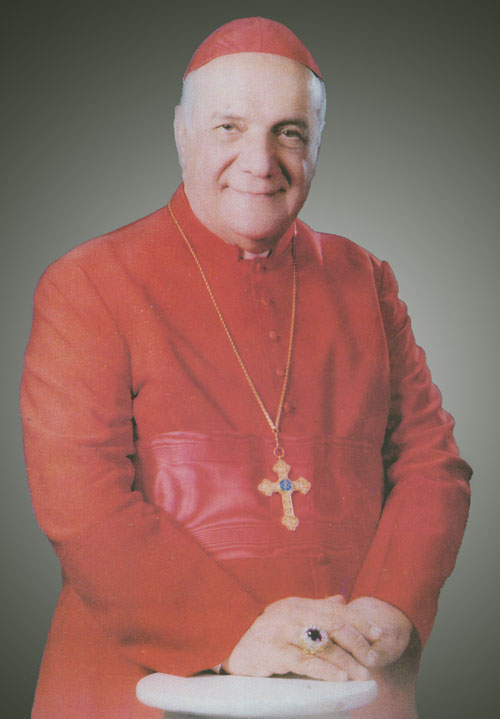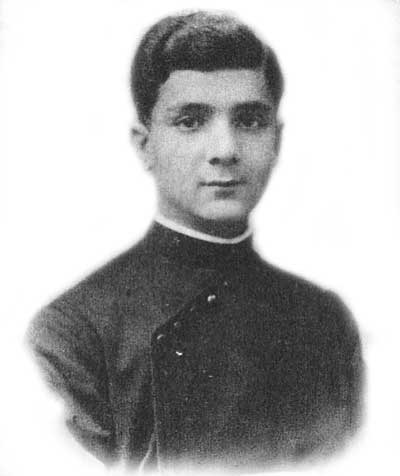

 (AINA) -- On July 7, 2003 Assyrians (also known as Chaldeans and Syriacs) of all denominations and from all communities were saddened by the passing of His Beatitude Raphael Bedawid, the Patriarch of the Chaldean Church. Mar Bedawid finally rested in Beirut, Lebanon, following a long, debilitating illness. Always ecumenical and a known unifier, Mar Bedawid was universally respected within his Chaldean Church as well as the other sister Assyrian Churches including the Assyrian Church of the East, the Ancient Church of the East, the Syriac Maronite Church, the Syriac Orthodox Church, and the Syriac Catholic Church.
(AINA) -- On July 7, 2003 Assyrians (also known as Chaldeans and Syriacs) of all denominations and from all communities were saddened by the passing of His Beatitude Raphael Bedawid, the Patriarch of the Chaldean Church. Mar Bedawid finally rested in Beirut, Lebanon, following a long, debilitating illness. Always ecumenical and a known unifier, Mar Bedawid was universally respected within his Chaldean Church as well as the other sister Assyrian Churches including the Assyrian Church of the East, the Ancient Church of the East, the Syriac Maronite Church, the Syriac Orthodox Church, and the Syriac Catholic Church.
Born in Mosul (ancient Nineveh) on April 17, 1922 to Mariam Nissan Bedawid and Yousif Abdelahid Bedawid, Raphael Yousif Warda had five brothers and one sister. The ancestral family home originated in Bedareh near Zakho. Mar Raphael began his training for the priesthood at the age of 11 at the Patriarchal Seminary in Mosul. The gifted young Raphael was received in Rome at the age of 14. Due to his exceptional abilities, the usual minimum age requirement for entrance into the seminary in Rome was waived by Cardinal Fomozoni Bwendi. Mar Raphael was consecrated a priest in October, 1944 in St. Antonios Church in Rosekom University. Then, in 1946, Mar Raphael obtained his doctorate degree "Summa Cum Laude." His dissertation was translated from Latin to French and published by Cardinal Tesseran.
In 1956, Mar Raphael was commissioned to Karkuk to become the Patriarchal Vicar. Shortly thereafter, in 1957, Mar Raphael was ordained Bishop of the Amadia district of northern Iraq at the unprecedentedly young age of 35. The diocese of Amadia was greatly enriched under the guidance of Mar Raphael. During his tenure, Mar Raphael developed several Chaldean centers in Amadia, Araden, Shamkan, completed the Sacred Heart monastery for nuns, and established libraries.
The eight years following his appointment as bishop saw increasing attacks1 by Kurdish paramilitary forces in northern Iraq. The escalating attacks against Christians in northern Iraq by Kurds culminated in the looting of the Bishopric as well as the sacking and burning of the library and calligraphy collections that Mar Raphael had painstakingly established and tirelessly nurtured. In 1966, Mar Raphael was transferred to Beirut, Lebanon where he and his sister's family ultimately maintained their personal residence.
Mar Raphael returned to Iraq in 1989 for the Chaldean Bishop's Holy Synod call to elect a new Patriarch following the death of Mar Pulus Chekho II. On May 21, 1989 Mar Raphael was elected Patriarch of the Chaldean Church. Mar Raphael's most noteworthy achievements as Patriarch include being a primary catalyst for establishing an Iraqi Christian Council for all Christian Churches, the establishment of Babylon College for Religious Studies, and the establishment of the Catholic Bishops Conference in Iraq.
 In recent years, Mar Raphael stirred controversy within the Chaldean Church with his declaration that his ethnic ancestry was indeed Assyrian and that the term Chaldean referred to his Church affiliation. The bold declaration by the Chaldean Patriarch himself was widely viewed as a stinging reprimand of a newly emerging radical fringe separatist group within the Church bent on establishing a new separatist identity for Chaldeans. The Patriarchal statement instead bolstered the mainstream unionist Chaldean position espousing national unity with other Assyrians.
In recent years, Mar Raphael stirred controversy within the Chaldean Church with his declaration that his ethnic ancestry was indeed Assyrian and that the term Chaldean referred to his Church affiliation. The bold declaration by the Chaldean Patriarch himself was widely viewed as a stinging reprimand of a newly emerging radical fringe separatist group within the Church bent on establishing a new separatist identity for Chaldeans. The Patriarchal statement instead bolstered the mainstream unionist Chaldean position espousing national unity with other Assyrians.
Perhaps what most endeared Mar Raphael to all Assyrians whether they be called Assyrians, Chaldeans, or Syriacs was his tenacity and rootedness in his ancestral home. For, despite the pressures, intimidation, interference, and persecution by the Iraqi government, Mar Raphael pointedly and steadfastly maintained the two millennia long legacy of the Church of the East by maintaining the Holy See of the Chaldean Church of Babylon in Bet Nahrain (Mesopotamia). Mar Raphael was the penultimate survivalist, often having to navigate between the welfare of his Church and the suffocating Arabist policies of the Baath government. At times, the pressures were too great and Mar Raphael needed a brief respite in his newly adopted home in Lebanon, but even there neither in his heart nor in his official capacity did he ever abandon his ancient roots.

or register to post a comment.